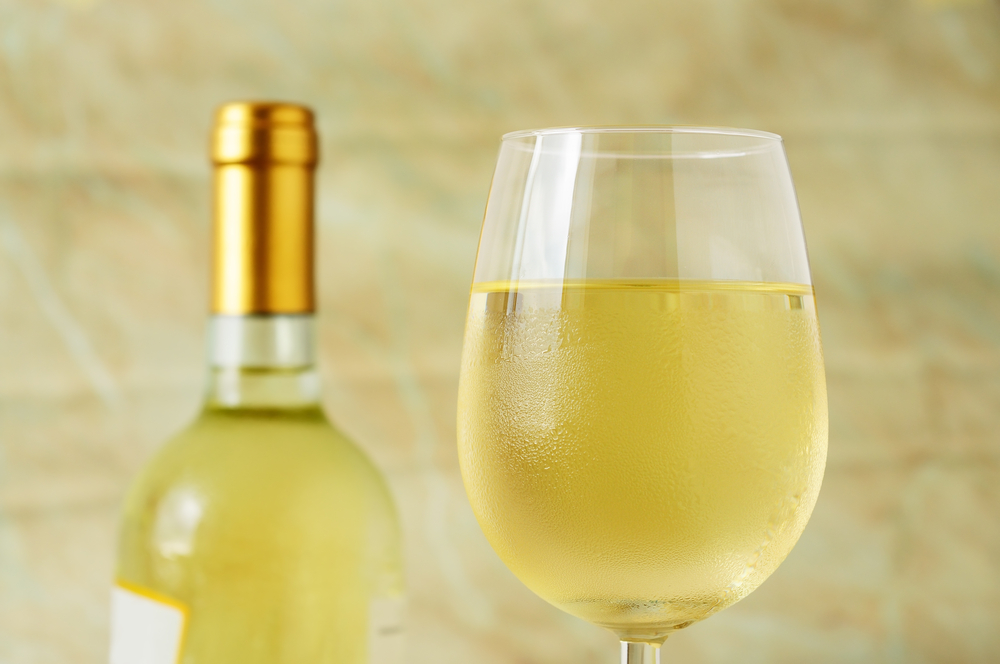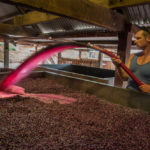We’ve all been in a situation where we’ve put a bottle of wine in the freezer in an attempt to make the drink cold quickly.
We’ve also all been in a situation where we’ve purposely left a bottle of wine in the freezer in hopes of prolonging its shelf life, but without actually knowing if wine can or is allowed to freeze.
Regardless of why you have put a bottle of wine in the freezer or if you’re wondering whether wine can freeze, you’ve come to the right place! Wine can and does freeze – it just all depends on the temperature of the freezer in relation to the wine’s alcoholic content.
Here is everything you need to know about what temperature does wine freeze!

What Temperature Does Wine Freeze At?
While it depends on the alcoholic content of the bottle of wine you wish to freeze, the average temperature that wine freezes at is 22 °F.
The reason it depends on the alcohol content is that the higher the ABV percentage, the lower the wine’s freezing point is. This means that if the alcohol content of a bottle of alcohol is 20% ABV, for example, its freezing point is 15 °F.
If the alcohol content is at 60%, then the freezing point is -35 °F.
As most bottles of wine have an average ABV value of 13.5%, this will make the average freezing point of wine 22 °F. However, it’s not just the alcoholic content that determines the bottle’s freezing point.
There are a bunch of other factors that can affect the wine’s freezing point, including non-alcoholic compounds such as sulfate. As these compounds vary in each bottle of wine, the exact freezing point will also vary.
Can I Age Wine In The Freezer?
It’s quite rare for someone to put wine in the freezer to age it, as most will put wine in the freezer to keep it chilled for consumption. For those who intend to age wine, the key is to never change the temperature of the refrigerator.
Wine needs consistency to age properly, plus it needs to age in an environment that is warmer than a freezer.
The temperature requirements for aging wine is said to be 55 °F according to experts. As many regular fridges cannot be adjusted to this temperature, most people who intend to age wine in their refrigerator will buy a wine fridge.
This is especially true for those who don’t have their own wine cellar or basement that maintains this temperature consistently.
Keeping Wine Cool For Consumption
The best way to keep wine cool for consumption is to keep it in the refrigerator – but it depends on the type of wine. White wine is designed to be consumed at a cool temperature, but red wine is meant to be consumed at room temperature or potentially warmer.
Therefore, unless you have a preference for cold red wine, you should only put white wine and rosé in the refrigerator for consumption.
The rule of thumb is that white wine should be kept at temperatures of 52 °F, while red wine should be kept at temperatures of 66 °F.
Once opened, it’s best to keep the bottles closed with either the bottle cap or a bottle stopper to maintain its freshness. Keeping the wine opened will significantly reduce its shelf life and quality, even when it is kept in ideal temperatures.
Is It OK To Put Wine In The Freezer?
It is absolutely OK to put wine in the freezer, you’ve just got to remember when to take it out! Especially if you have paid good money for a bottle of champagne, which you definitely don’t want to freeze by accident.
There are several things to remember when it comes to putting wine in the freezer. The first is that the wine will not defrost for you to consume it immediately unlike when the wine is stored in a refrigerator.
The best way to defrost a frozen bottle of wine is to wait 1-2 hours, which can be annoying if you’ve forgotten to take the wine out of the freezer for a particular event.
Alternatively, you can always run the frozen bottle of wine under warm water. However, this can be dangerous, as it runs the risk of the bottle breaking under the sudden impact of warm water.
If you’re desperate for a last-minute defrosting method, then this is the best way to defrost frozen wine – just be mindful that the bottle might break.
Not only might a bottle break because of the change in temperature, but liquid expands in size as it solidifies. This means that as the wine freezes, it will expand inside the bottle, which builds up pressure.
In some cases, people will find that their bottle has cracked or exploded in the freezer before they’ve even taken it out. This is another reason to not put red wine in the freezer, as this can lead to the cork being slowly pushed out of the bottle due to the pressure build up.
Dealing with broken glass is never fun – especially when the glass has broken inside the freezer. You’ll also have to clean up frozen shards of wine, so make sure to wear a pair of rubber gloves to prevent slicing your hands.
Of course, you can also drink a partially-frozen bottle of wine. Partially-frozen rosé in particular is quite enjoyable to drink as an alcoholic slushy.
Just keep in mind that you probably won’t be able to pour the liquid out of the bottle, so invest in an extra long straw to reach the bottom!
The only problem with consuming defrosted wine is that the wine itself will have diluted. This is because the water in the wine will have frozen first, which will create the same effect as putting ice cubes in a glass of wine, which dilutes it significantly.
The best way to prevent diluting your wine after freezing it is to make ice cubes out of the same liquid – to do this, pour the wine into some silicone ice cube trays.
Once the wine has fully defrosted, you can put the frozen wine ice cubes back into the wine to bring back the flavors. Alternatively, freeze some grapes!
How Long Does Wine Take To Freeze?
On average, it takes around 5 hours for a bottle of wine to freeze completely. The colder the freezer, the faster it will take for the wine to freeze, and vice versa.
Does Wine Completely Freeze?
The alcohol content of the wine will determine how much of the wine actually freezes. You read that right – in some cases, a bottle of wine won’t completely freeze.
It all comes down to the alcohol itself known as ethanol. Ethanol freezes at temperatures between -144 °F or -173 °F, which is so low that even humans can’t stand it.
However, this doesn’t mean that wine freezes at these temperatures, because wine isn’t entirely made of ethanol. For the average bottle of wine with an ABV of 13.5%, it will most likely freeze at 15 °F.
The lower the content of the alcohol, the easier it is for the wine to freeze. The reason for this is that the sugar and water (and other non-alcoholic compounds) in the wine will rise and freeze quicker than the ethanol.
However, this means that wines with a low ABV value that has been produced poorly will only partially freeze. While this might be enjoyable for the texture of a slushy, this means that the wine will never be completely frozen.
Half of the bottle will be a bitter liquid, while the other half will be a bland, flavorless slush.
Conclusion
So, there you have it! Hopefully, this guide will have given you an idea on how to safely and properly freeze and defrost wine to enjoy the benefits of keeping wine in the freezer.
- Shrimp Cocktail (and More) Wine Pairing Guide - 09/06/2022
- What Wine Serving Sizes Look Like: Standard Size and More - 08/06/2022
- How Much Sugar is in Wine: Glass and Bottle Sugar Content - 08/06/2022






